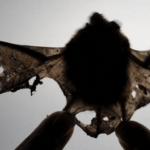Teen Science Café: Nature Crime
By Alicja Mazurkiewicz, Teen Science Café President
The Bethesda Green Teen Science Café is a free, fun way for teens to engage in lively conversations with STEM experts about environmental issues. Run by and for high school students, the Bethesda Green Teen Science Café hosts chats with guest speakers in which participants learn about advances in environmental science and technology and gain exposure to different careers in the environmental field. The following is a summary of the session hosted on Monday, May 2nd, 2022 with Dr. Meredith Gore, University from the University of Maryland College Park.
Bethesda Green’s Teen Science Cafe virtually hosted Dr. Meredith Gore, a researcher at the University of Maryland who specializes in building conservation evidence to inspire action. As such, the topic of Dr. Gore’s presentation was “Nature Crime,” or more formally, Conservation Criminology.
Dr. Gore introduced us to Nature Crime as a concept and why it is significant. Some examples of nature crime she touched on are wildlife trafficking, illegal logging, ocean plastic, e-waste, and, more broadly, climate change. We usually think of crime as an activity violating criminal law; however, Dr. Gore explained that it also has a social and moral dimension – how nature crime often harms disadvantaged and vulnerable populations.
Dr. Gore described her fieldwork as analyzing a conservation criminology issue, through which she engages in interviews and collaborations with local experts and populations to collect data.
Dr. Gore went into detail about one of the cases she has been studying: the sea cucumber trade. Sea cucumbers serve an important role in nutrient cycling in marine ecosystems. They are a luxury food in some countries, and with rising prices, sea cucumbers have become a prime target for illegal fishing. As a result, the thriving sea cucumber population in Mexico quickly collapsed. Additionally, illegal fishing undermines those who fish legally. Dr. Gore and her team used various techniques to map out incidents of this illegal fishing and trade to bring attention to the importance of this seemingly mundane creature in the environment and the scope of international nature crime. Dr. Gore concluded that promoting new marine protected areas and implementing community-based crime prevention strategies could hold a lot of promise for reducing harm to both people and the marine environment. However, nature crime is not only an issue abroad; Dr. Gore noted that illegal wildlife trafficking reaches the US from 214 countries, with pythons as the most trafficked animals.
Overall, awareness of wildlife trafficking is essential because it can help to promote environmental conservation, protect public health, support sustainable development, and aid in legal enforcement.
About the Authors:
 Alicja Mazurkiewicz, Teen Science Café President
Alicja Mazurkiewicz, Teen Science Café President
Alicja’s passions lie in identifying and implementing approaches to preserve the health of the environment against the threats of rising pollution and climate change. As a young person, she wants to do her part in protecting the environment.





